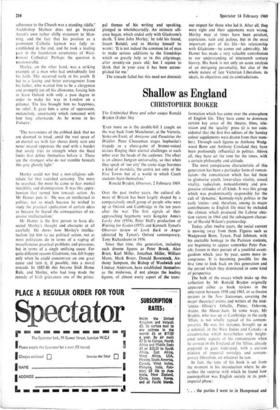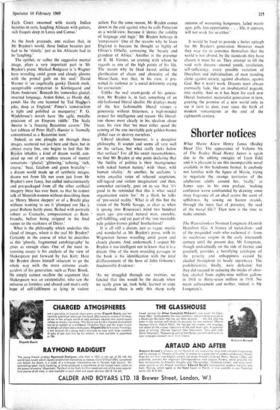Shallow as England
CHRISTOPHER BOOKER
The Unfinished Hero and other essays Ronald Bryden (Faber 36s) `Even more so is the double-bill I caught on the way back from Manchester, at the Victoria, Stoke-on-Trent, of Antigone and Pseudolus the Diddler. Peter Cheeseman stages Sophocles's tragedy as a chess-game of bronze-voiced statues flinging their eternal challenges at each other over the heads of the audience. The effect is an almost Jungian universality, so that when they speak of 'our city' the arena stage becomes a kind of mandala; the centre not only of the Five Towns but of a world in which Czech students burn themselves.'
Ronald Bryden, Observer, 2 February 1969.
Over the past twelve years, the cultural cli- mate of Britain has been largely shaped by a comparatively small group of people who were up at Oxford and Cambridge in the ten years after the war. The first signals of their approaching hegemony were Kingsley Amis's Lucky Jim (1954), Peter Hall's production of Waiting for Godot (1955) and Kenneth Tynan's Observer review of Look Back in Anger (directed by Tynan's Oxford contemporary, Tony Richardson) in 1956.
Since that time, this generation, including such diverse figures as Peter Brook, Alan Brien, Karl Miller, Jonathan Miller, William Mann, Mark Boxer, Donald Baverstock, An- thony Sampson, the Bishop of Woolwich and Lindsay Anderson, have established themselves as the midwives, if not always the leading figures, of almost every aspect of the trans-
formation which has come over the atmosphere. of English life. They have come to dominate certain key areas of the theatre, films, tele- vision and the 'quality' press (it is not coin- cidental that the first five editors of the Sunday colour supplements were drawn from their num- ber). Through such figures as Anthony Wedg- wood Benn and Anthony Crosland they have been profoundly influential in politics. Ahove all, they have set the tone for the times, with a certain philosophy and attitude.
The most conspicuous characteristic of this generation has been a particular form of roman- hicism—the romanticism which has led them to glamorise youth, lower-class vitality, sexual vitality, radicalism, nonconformity and pro- gressive attitudes of all kinds. It was this group which was predominantly responsible for the cult of 'dynamic,' Kennedy-style politics in the early 'sixties—and, therefore, among its major contributions to English life must be included the climate which produced the Labour elec- tion victory in 1964 and the subsequent charac- ter of Harold Wilson's premiership.
Today, after twelve years, the social current is moving away from them. Figures such as Wedgwood Benn, Tynan, Paul Johnson, with his excitable homage to the Parisian students, are beginning to appear somewhat Peter Pan- ish; frozen in their pursuit of a youthful avant- gardism which, year by year, seems more in- congruous. It is becoming possible for the first time to look back on this generation and the period which they dominated in some kind of perspective.
The bulk of the essays which make up this collection by Mr Ronald Bryden originally appeared either as book reviews in the SPECTATOR between 1958 and 1963, or as theatre reviews in the New Statesman, covering the major theatrical events and writers of the mid- 'sixties—Olivier's Othello, Pinter, Osborn% Arden, the Marat I Sade. In some. ways, Mr Bryden, who was up at Cambridge in the early 'fifties, is not wholly typical. of his contem- poraries. He was, for instance, brought .up as a colonial, in the West Indies and Canada—a circumstance which nevertheless only height- ened some aspects of his romanticism when he arrived in the England of the 'fifties, already prepared to gaze wide-eyed, with a curious mixture of imperial nostalgia and contem- porary liberalism, on whatever he saw.
In fact, the tone of his book is set from the moment in his introduction where he de- scribes the surprise with which he found how cosmopolitan was English society in its post- imperial phase: . . the parties I went to in Hampstead and Earls Court swarmed with stately Indian beauties in saris, laughing Africans with guitars, rich Iraquis deep in Lorca and Camus.'
As the book proceeds, one realises that, in Mr Bryden's world, those Indian beauties just had to be 'stately,' just as his Africans had to be 'laughing.'
The epithet, or rather the suggestive mental image, plays a very important part in Mr Bryden's prose. Michael Redgrave is 'a Wagner hero wrestling amid green and cloudy glooms with the primal guilt on his soul.' David
Warner is 'an angelically gawky Danish stork, recognisable compatriot to Kierkegaard and Hans-Andersen.' Beneath his 'somewhat glacial, - inverted language, Arden fishes, as Hardy did,
ponds like the one haunted by Ted H s's pike, deep as England.' Pinter's 'construe ton is tight and polished as marquetry.' P. G.
Wodehouse's novels have 'the agile, metallic precision of an Empson riddle.' The Scala theatre is 'a freezing Byzantine cavern.' The last tableau of Peter Hall's Hamlet is 'formally conventional as a Byzantine icon.'
Indeed, as one ploughs on through these images, scattered not just here and there, but in almost every line, one begins to feel that Mr Ili ken inhabits a kind of dream world, con- jured up out of an endless stream of mental sensations—'glacial,"glittering,"echoing,"rich, coarse,"heat, fatalism and green brutality'— a dream world made up of synthetic images, drawn not from life nor even just from Mr Bryden's own fancy, but culled indiscriminately and pre-packaged from all the other artificial imagery there has ever been, so that he cannot talk of Moorish momen without describing them as 'Henry Moore sleepers' or of a Brecht play without wanting to see it 'plumped out like a great Rubens battle piece, fleshed with portraits robust as Cranachs, compassionate as Rem- ' brandts, before being stripped in the final scenes to the starkness of Darer.'
What is the philosophy which underlies this cloud of images, where is the real Mr Bryden?
Certainly in the course of what he describes
as this "ghostly, fragmented autobiography' he gives us enough clues. One of the most in- teresting essays is his analysis of the view of Shakespeare put forward by Jan Kott. Here Mr Bryden shows himself reluctant to go the whole way with the more extreme avant- gardists of his generation, such as Peter Brook. He simply cannot swallow the argument that Shakespeare was an existentialist, who saw the universe as formless and absurd and man's only hope of self-fulfilment as lying in violent action. For the same reason, Mr Bryden comes down in the end against what he calls Pinterism as a world-view, because it 'denies the validity of language and logic.' Mr Bryden believes in 'compassion.' One of the reasons why he teSves England is because he thought so highly of Olivier's Othello, conveying the 'beauty and grandeur of Africa.' Another is the presence of E. M. Forster, an evening with whom he regards as one of the high paints of his life. The reason why he liked Saved, unlike the glorification of chaos and absurdity of the Marai I Sade, was that, in his view, it pre- sented its violence as 'a social deformity crying for correction.'
Unlike the real avant-garde of his genera- tion, Mr Bryden is, in fact, something of an old-fashioned liberal idealist. He displays many of the less fashionable liberal virtues—a generosity without bitterness, a high-minded respect for intelligence and reason. His liberal- ism shows most clearly in his idealism about race, his view that 'we must either speed the coming of the one inevitable pale golden-brown global race or destroy ourselves.'
Liberal idealism, however, is a deceptive philosophy. It sounds and seems all very well on the surface, but what really lurks below that surface? For all his sweet reasonableness, we find Mr Bryden at one point declaring that 'the futility of politics is their incongruence with _naked human nature,' with 'sheer, wild human vitality.' At another, he acclaims 'a witty anarchic voice of released scepticism, self-regard and violent imagination' and then, somewhat curiously, goes on to say that 'it's good to be reminded that this is what social organisation exists for.' At a third, he talks of 'pre-social reality.' What is all this but the vision of the Noble Savage, as clear as when it sprang into Rousseau's mind two hundred years ago--pre-social natural man, anarchic, self-fulfilling, and yet part of the 'one inevitable pale golden-brown global' brotherhood?
It is all still a dream, just as vague, mystic and wonderful as Mr Bryden's prose, with its Wagnerian heroes wrestling amid green and cloudy glooms. And, underneath, 1 suspect Mr Bryden is too intelligent not to know that it is a dream. One of the most revealing passages in the book is his identification with the total disillusionment of the hero of John Osborne's Inadmissible Evidence:
'As we struggled through our twenties, we fancied that this would be the decade when we really grew up, took hold, learned to cope . . . instead there is only this sharp early
autumn of worsening hangovers, failed marri- ages, pills, lost opportunity . . . life, it appears, will not work for us either.'
It would be hard to provide a better epitaph for Mr Bryden's generation. However much they may try to convince themselves that the world is not absurd, by the standards they have chosen it must be so. They attempt to fill the void with dreams—eternal youth, revolution, self-sufficiency, every possible variation of liberalism and individualism, of man standing alone against society, against absolutes, against God. But it won't work. Dreams must always eventually fade, like an insubstantial pageant, into -reality. And so it has been for each new -liberal, humanist, materialist generation in turn, greeting the promise of a new world only to see it turn to dust, ever since the birth of modern romanticism at the end of the eighteenth century.



































 Previous page
Previous page